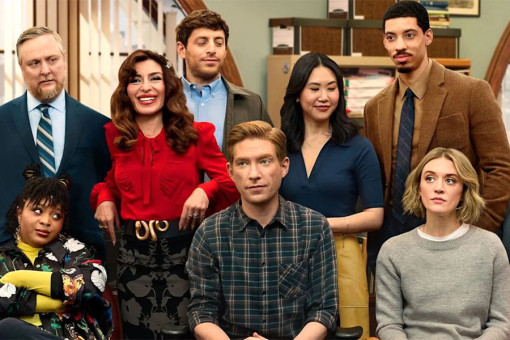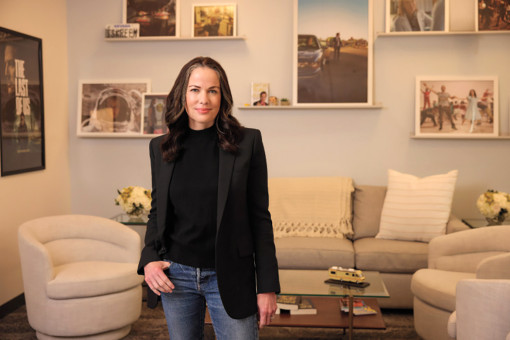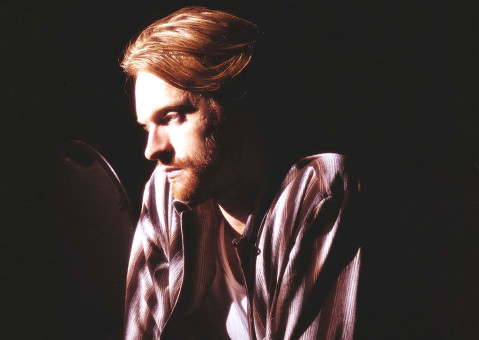Ricky Gervais sleeps like a baby.
Well, make that a toddler. “In fact, I sleep a lot. I like about nine or 10 hours. I tell myself that it’s because I’m a genius, but it’s actually because I’m like a toddler. I run around all day doing five things at once – I’ve got that sort of brain, I’ve always been like that – and then I collapse,” he says.
Hard to believe with all he’s got going on. Gervais is promoting his new Netflix film, Special Correspondents, preparing for his first stand-up tour in six years, finishing up work on the next incarnation of David Brent, his character from his original version of The Office, plus various television appearances, commercials and the like. The average person would collapse long before Gervais apparently does.
Talking to Ricky Gervais is like stepping into a constantly whirling kaleidoscope of creativity. He moves fluidly from one topic to the next, laughing and enjoying the ride and taking his listener along on the journey.
However, he doesn’t see what he does as all that much.
“But you know, I suppose some people say I do a lot, and I don’t think that I do, really, because I think it’s the way I work. Winston Churchill said if you find a job you really love, you’ll never work again. And I sort of can’t believe my luck, really, that I do this for a living. I get up in the morning, and I think of things as a job, and then I do them, and they’re fun, and then people watch them and people pay me to do that.”
He continues, “I think I started late and I’ve always been quite a lazy, unambitious person. I just ambled along, and I always tried to have a good time and have fun. And I was always doing creative things; I was always creative, but just for fun, not as a vocation. And then I sort of stumbled into writing and directing and acting at [age] 38-39. I suppose I had my retirement between 21 and 38, and now I’ve got to work ‘til I die.”
And he does not want to die with anything undone. “There’s a Keats poem that says ‘If I should die before my pen has gleaned my teeming brain.’ He doesn’t want to die with an idea, and I don’t want to die with any of these ideas left.
“So, I’m doing lots of things at once, and I’ve always got a backlog of ideas. I’m always working on three things at once, which is sort of crazy, but it’s the way I do it. There might even be something wrong with me, but I have such a short attention span. But I like doing something all the time, which is not the same thing.
“So, I’ll be writing two screenplays or two TV shows or some stand-up, and then I’ll go and write a song for the David Brent project.
“Then I’ll go for a run and I’ll come back with a stand-up routine, and I’ll tell my girlfriend , and she’ll say 'please don’t do that in public.'
“And I’m watching TV and I’ve got a little notebook on my laptop. I’m just downloading things that might be useful. I’ve got about nine notebooks, and I find one after a year and I find something that I scribbled down, and I go, 'Oh yeah, that could be my next sitcom.' And then I decide one to do and I do it.
“I don’t really hang around with ideas. I couldn’t do this seven years or 22 shows a year. I just couldn’t do it. So, I do my thing. I feel I’m kind of a cottage industry. I do it all myself. It’s all handmade, my product.”
But that’s just what he does for himself. He also appears in films, television shows, awards shows, but that doesn’t count to him as work he’s doing. “I also think a lot of people count things I’ve done that I don’t even count myself.
“People said what would I count in my oeuvre, and I say The Office, Extras, Derek, a couple of movies, and a few stand-up shows.
“I don’t really count Golden Globes or popping up in a huge family film I did for a favor. But other people do. In fact, it’s weird, because people see me at the Golden Globes. It’s watched by 200 million people. Or they see me at the Emmys, watched all around the world. They don’t see me writing every day, or directing every day, so they kind of see me as a famous person who pops up. They don’t really understand.”
Of the work he does count, he says, “It’s a kind of iceberg effect. If I’m in something that I’ve written, the writing and directing has taken two years, and me acting is 15 minutes. So, I think people think that I’m doing more than I am, in a way. But it’s very nice. But I don’t feel prolific. I feel like I’m playing every day, and someone somewhere buys it.”
Gervais is also very sanguine about the idea of career-building and building a brand. “There’s never any rush, I never feel rushed. ‘Oh I’ve got to get something on telly this year, or they’ll forget about me. Or I’ve got to do a stand-up show or they’ll forget about me.’
“I’ve just started my first stand-up show for six years. I haven’t done a movie for six years, and then two in one year. That’s just how it falls, when something’s greenlit and one comes forward with the funding, and suddenly you do two. So it’s difficult to know what people think. I’m always doing something, just puttering around doing something, and it falls into place.”
Perhaps the closest thing to a constant in Gervais’s career is David Brent, the clueless office manager he created for his BBC version of The Office, which has also been produced and recreated all over the world, with Gervias’s permission. “I produced the American version of The Office, and seven other versions around the world – Israel, France, Germany, French Canada, Chile.
"My version is shown in about 98 countries around the world, so there’s not a day that goes by that I’m not giving permission for a clip on a chat show or a quiz machine.”
Brent, too, has captured the world’s imagination. So much so that Gervais has recently completed a film bringing him back, David Brent: Life on the Road. It seems that David Brent is the character who never dies.
“That’s right. It’s funny isn’t it. It seems that way to me. I never really felt he went away. I left The Office alone, and, with this new movie, I’m not bringing The Office back. That would be weird, the same people sitting in the same desks, but it’s what David Brent’s doing now.
“I feel he’s a real person. It [The Office] was about TV in itself, and it’s right now to bring him back when the world’s different than it was. Then, the biggest influence on The Office, well, obviously because I worked in an office for 10 years, but apart from that, I’d watched a lot of those quaint docu-soaps, where ordinary people were getting their 15 minutes, and now they’ve got a DVD to show the kids.
“But now fame’s different. Now there’s a new breed of people who want to be famous. Now there’s people who live their life like an open wound to be famous. They let the cameras in their heart and houses and minds 24/7. There’s no difference now between fame and infamy.
“This is a whole new breed. If Brent was sort of Terminator 1, now there’s Terminator 2, and they’re harder, they’re more relentless, they will do anything to be famous. And it’s about that world.
“Since I did The Office, they did The Apprentice, where people get on it by thinking like ‘I will destroy anything that stands in my way.’ You’ve got a potential future president who says things like, 'I’d like to punch him in the face.'
“There are people out there who feel that they aren’t represented, and they’re angry and they want what’s theirs, and it’s a real dog-eat-dog culture now that has changed in my adult life. I’ve seen the change in culture.
"And Brent, now, you’ll like him more now I think, because he’s more of an underdog. He hasn’t changed, but the world has. So, now, he’s 55, he’s not the boss anymore, and he’s in a room full of alpha males who eat him alive.
“And it’s funny that he’s come back, because he’s come back to a different world. He’s more out of place, he’s more out of time. He’s free falling, and he doesn’t know what to do. He wants this second bite of fame.
“And it’s about fame, just like Special Correspondents. I think people, when they first saw it, they thought is was a satire, and it is, a little bit, about media and journalism, and power, and lies, and all those things. But actually, it’s me having another go about fame, about what people will do to be famous. It’s really about that, about temptation.
“Because we see these people now becoming famous just for being famous, for doing nothing and just being themselves. And that’s irresistible to a kid. A kid thinks, 'Well, they’re happy, and they didn’t have to go to school and get a job, and they’re millionaires.' And kids think, 'well, I can just go on a talent show and I can be a singer.'
“We’re gonna run out of doctors soon. Everyone’s just going to want to be singing. Even TV is about [that]. People are not watching TV anymore, so you get these people trying to get a two-minute viral video to go on YouTube the next day to keep their brand alive. It’s really scary.”
In the end, Gervais sees all of his work having a common thread. “It’s funny. All this that we’re talking about now, it does seep into your work. I was thinking back, and everything I’ve done is quite existential, really.
“The Office is about becoming middle-aged, and what you’re doing with your life and boy meets girl and all those things, and Derek is about being 80 and looking back and passing on something, and even my children’s book, Flanimals, it’s about this sort of playing with the futility of existence and struggling to survive.
“And everything I do as well, I’ve realized that it’s about humanity. It always comes down to that. It’s the big questions, what’s right, what’s good. What am I doing, what am I watching here I think that’s what we do in fiction, even something as lowly as comedy. We create our own heroes and villains. We role play for the soul.”


















